We Tested 11 Citrus Juicers to Find the Best Ones for Tackling Citrus Big and Small
Dotdash Meredith and Yahoo Inc. may earn commission or revenue on some items through the links below.
Our top picks include models from Breville, Smeg, and Black+Decker.
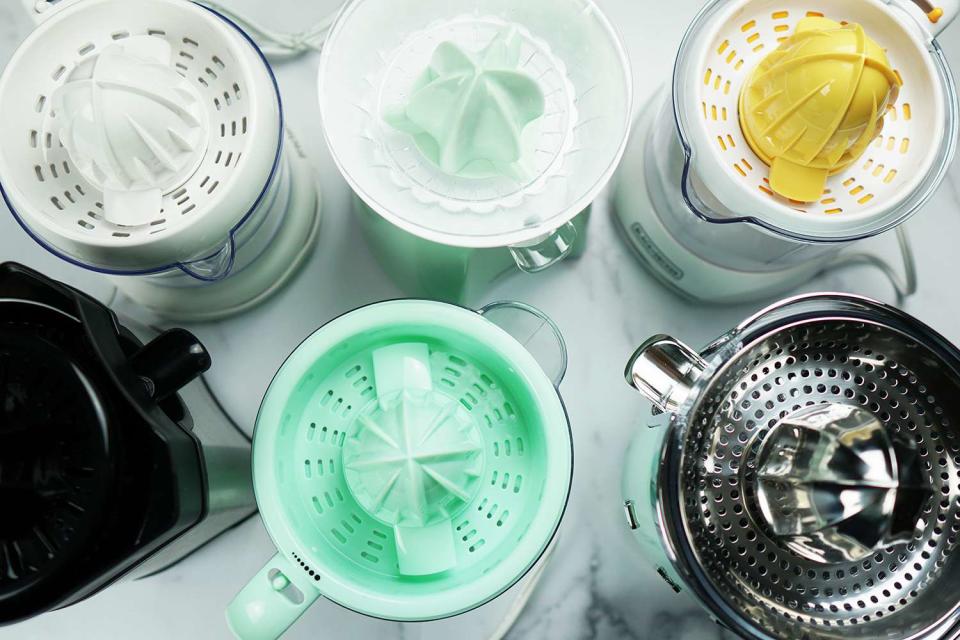
Serious Eats / Riddley Gemperlein-Schirm
For performance and ease of use, it’s hard to beat the Breville Citrus Press Pro Electric Juicer or Breville The Citrus Press. We also recommend the Smeg Citrus Juicer (harder on the wrists, but very aesthetically pleasing and well-performing), BLACK+DECKER Citrus Juicer (terrible sounding, but does a good job and is budget-friendly), and Vinci Hands-Free Electric Citrus Juicer (it did not perform the best, but is a mostly automated option for those who find traditional electric citrus juicers hard or inaccessible to use).
Checking out with a literal grocery cart full of citrus got me a few sideyes from Trader Joe’s employees. “It’s for a review,” I whisper-shouted at the cashier, who looked at me a little strange and then said, “I asked if you wanted the grapefruits in a bag.” Fine. Someone was clearly feeling self-conscious! (It was me.)
But, I will suffer for my work, the work being: testing electric citrus juicers. These machines are helpful if you’re a fan of fresh-squeezed orange or grapefruit juice or if you’re looking to juice a whole bunch of citrus to make something like a lemon custard or key lime pie. To find the best models, I evaluated 11 popular electric citrus juicers—using them to juice citrus of different sizes and evaluating their speed, yield, usability, and cleanup.
The Winners, at a Glance
Breville Citrus Press Pro Juicer
The Best Electric Citrus Juicer

This model juiced exceptionally well (especially large citrus) and consistently produced some of the highest yields in the least amount of time. It had a reamer with a large spindle that anchored citrus in place, a juice cup that securely pressed the citrus down onto the reamer, and an ergonomic handle that felt comfortable to grip and use as leverage. Its all-metal construction comes at a higher price point, but makes for a quality, heavier machine that was anchored in place while it worked.
Breville The Citrus Press
Also Great

The Breville The Citrus Press is constructed much like the Press Pro (it even has the same wattage), performed equally well for the most part, and was just as easy to use. The Press Pro had a significantly higher orange juice yield, while its cheaper sibling did a little better with grapefruits. Ultimately, this could come down to variation in the citrus, but we did think that the metal construction and sturdiness of the Press Pro edged out The Citrus Press just slightly, and that’s why it appears first on this list. However, both are fantastic juicers, and you’d likely be happy with either.
Smeg Citrus Juicer
The Best Electric Citrus Juicer If Aesthetics Are of Concern
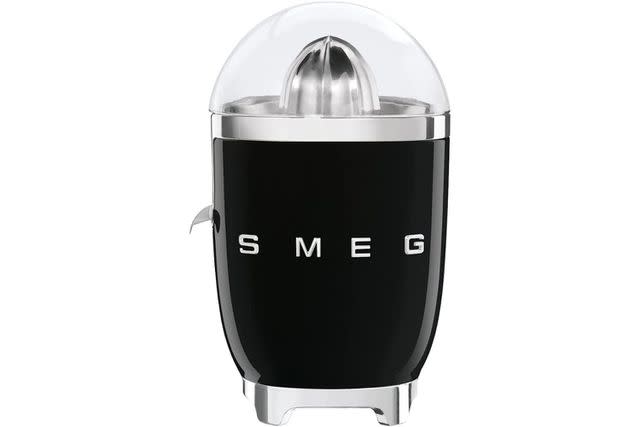
This was one of the best-performing juicers, especially out of the models that rely on hand strength to help juice citrus (versus a lever, like that of the Brevilles). It was also pretty quiet and, importantly, very aesthetically pleasing and available in a handful of colors. It has a domed lid the company says can be used “as a bowl for fruit and peel” and makes the juicer look a little like a rocket ship.
Black+Decker CJ625 Citrus Juicer
The Best Budget-Friendly Electric Citrus Juicer

While this juicer sounds not great when on, it worked the best of the inexpensive models we tested—juicing limes, oranges, and grapefruits effectively. It comes with a cover and wrap-around cord storage, too. Unlike the rest of our favorite models, the Black+Decker has a 32-ounce carafe with a pour spout that juice drains into, which could be appealing for those who don’t want to juice into a measuring cup/glass.
Vinci Hands-Free Electric Citrus Juicer
The Best Mostly Automated Electric Citrus Juicer

While this juicer didn’t perform the best, it still did well—especially with larger citrus. Its real appeal is in its ease: to use it, you open the hinged lid, add the citrus onto the reamer’s spindle, close the lid, then press a button and the juicer raises a straining platform up, compresses the citrus slightly, then rotates the platform/reamer to juice the citrus before lowering the platform back down. If you find citrus juicers that rely more on hand/wrist strength inaccessible, then this is a good option.
The Tests
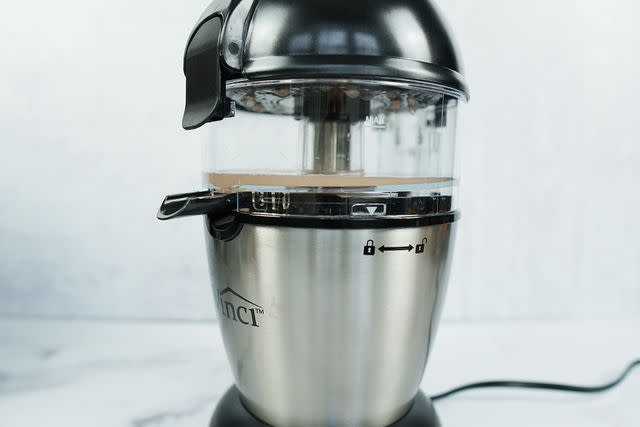
Serious Eats / Riddley Gemperlein-Schirm
The Vinci had a unique, hands-free design: a platform pressed into the citrus, rotated to juice the citrus, then lowered back down.Control Group: We juiced five limes by hand and with our favorite manual citrus juicer from Chef’n, weighing the fruit beforehand and the strained juice after juicing, and timing how long it took to do both.
Limes Test: With each juicer, we juiced five limes (halved) to see how the models did with a small citrus, timing how long it took to do so. We weighed the citrus before juicing and then weighed the strained juice, calculating the percentage yield.
Oranges Test: With each juicer, we juiced two oranges (halved) to see how the models did with a medium-sized citrus, timing how long it took to do so. We weighed the oranges before juicing, then weighed the strained juice to determine percentage yield.
Grapefruits Test (Winners-Only): With each of our favorite juicers, we juiced two grapefruits (halved) to see how they did with a large citrus. We weighed the grapefruits before juicing, then weighed the strained juice to calculate percentage yield.
Usability Tests: Throughout testing, we evaluated how easy each juicer was to use. We also noted how loud it was and the length of its power cord.
Cleanup Tests: We washed each juicer’s removable parts by hand after each test. We also placed our favorite juicers’ dishwasher-safe parts in the dishwasher after testing, making sure they emerged unscathed.
What We Learned
Lever-Style Electric Citrus Juicers Were Easier to Use, But Only When They Were Designed Well
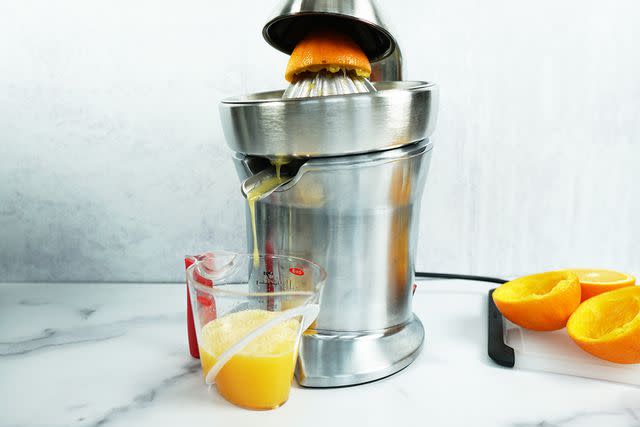
Serious Eats / Riddley Gemperlein-Schirm
There were two main styles of juicers, the first one being lever-operated. With these juicers, you place the fruit on a reamer’s spindle, then lower a lever with a dome-shaped juice cup down onto the reamer. The reamer rotates while the juice cup presses down on the citrus.
This style of juicer keeps you away from the juicing action, saving some hand/wrist strength (though you do have to use some to press and hold down the lever). However, only the Breville lever-style citrus juicers worked well enough for us to recommend them. These juicers only began rotating their reamers when the juice cup was lowered onto them and featured long, pointy spindles that really kept citrus in place. They also had reamers with pointier fins and longer wings that sat more flush at the base of the straining plate, meaning that they juiced citrus more effectively and continued to juice any extra pulp in the strainer plate as the reamer rotated. They were heavy (weighing about seven to 11 pounds), too, and felt very stable on the work surface.
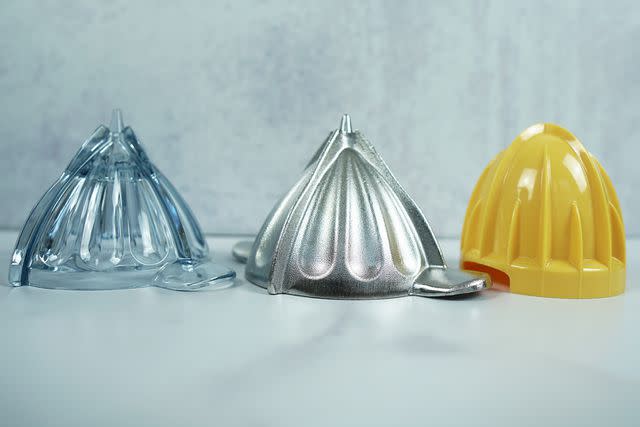
Serious Eats / Riddley Gemperlein-Schirm
The Brevilles' reamers (far left and middle) had sharper spindles and fins, which contributed to the juicers' efficacy.The other two lever-style juicers we tested (from Gourmia and Eurolux) were plagued by issues. For starters, their reamers began to move as soon as we put pressure on them, which happened pretty much every time citrus was placed on their spindles. This felt jarring. They also had duller reamers and shorter spindles that less effectively juiced citrus, especially smaller limes (the Gourmia only yielded 15% juice during this test compared to the Breville Pro’s 35%). They were also lightweight, and both featured suction cup bases, which were annoying and made them harder to move. The weight difference was particularly apparent with the Eurolox, which, at about 6.5 pounds, shifted more when on. Its handle also didn’t seem particularly well-secured and moved side-to-side as the reamer rotated.
Rotating Reamers Required More Hand and Wrist Strength
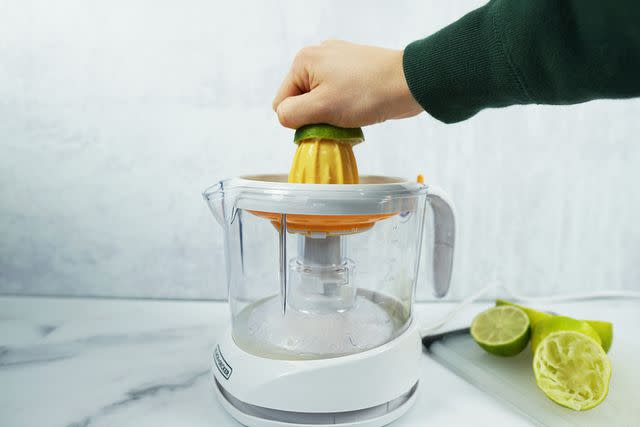
Serious Eats / Riddley Gemperlein-Schirm
The second predominant electric citrus juicer style was a pressure-activated reamer set over a strainer plate that either fed into a pitcher or smaller basin that had a chute and strained into a measuring cup/glass.
These pressure-activated reamers required more hand/wrist strength than the lever-style ones, as you had to continually press/hold the citrus down. Besides the Smeg, these juicers were also much smaller and lighter, which was a boon for storage but meant it was tougher to keep stable while working. They also tended to be much louder.
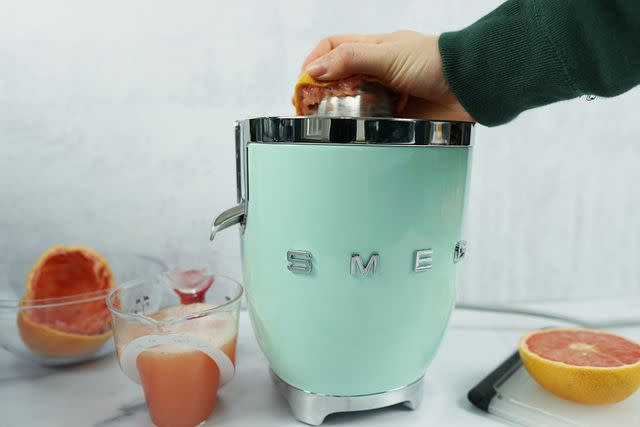
Serious Eats / Riddley Gemperlein-Schirm
This pressure-activated stye of juicer did best with larger citrus, where you could really wrap your hand around the citrus and reamer to aid in juicing.Outside of usability differences, this style of citrus juicer did worse with smaller citrus and better with larger citrus, as you could really wrap your hand around the oranges and grapefruits to help them contact the points of the reamer more and juice thoroughly. This type of juicer also often had smaller, shallower juicer plates, which meant leftover pulp spun around the top of the reamer’s wings instead of being further juiced as the reamer rotated, as happened with the Brevilles. Their reamers also tended to jam more because of this.
All of the Electric Citrus Juicers Made Great Juice
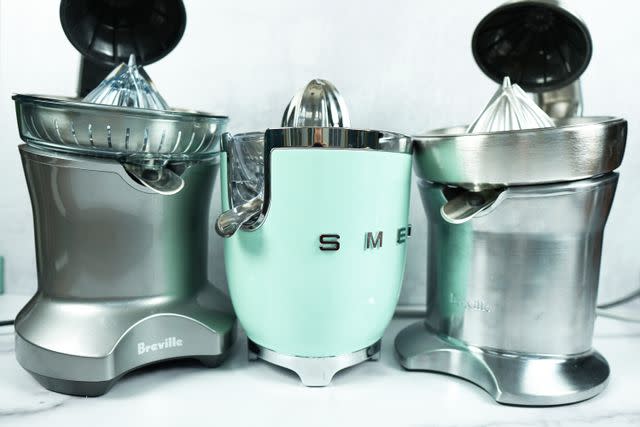
Serious Eats / Riddley Gemperlein-Schirm
Performance and usability aside, all of the juice from the electric citrus juicers was great. In fact, any taste differences were pretty minimal and, honestly, it was hard to tell if they could be attributed to citrus variation and not the juicer itself.
The takeaway: all of the juicers we tested made very nice, fresh-tasting citrus juice we’d happily drink and/or use in recipes.
There Were Minimal Cleanup Differences
Thanks to pulp and general citrus juice stickiness, all of the electric citrus juicers were, by design, a little annoying to clean. Plus, they all had multiple removable parts (a strainer plate, reamer, carafe, juice cup, etc.) that had to be scrubbed down separately. (Note: all of our winners had dishwasher-safe parts, though.)
Read More:We Juiced Hundreds of Lemons and Limes to Find the Best Manual Citrus Juicers
The one cleanup difference to note was with the reamers that had adjustable strainer plates meant to control pulp levels via a slider near the handle (like the models from Black+Decker, Dash, and Proctor Silex). These plates were dual-layered and most of them did not easily come apart, trapping pulp and juice and, generally, being tougher to get clean.
The Criteria: What to Look for in an Electric Citrus Juicer
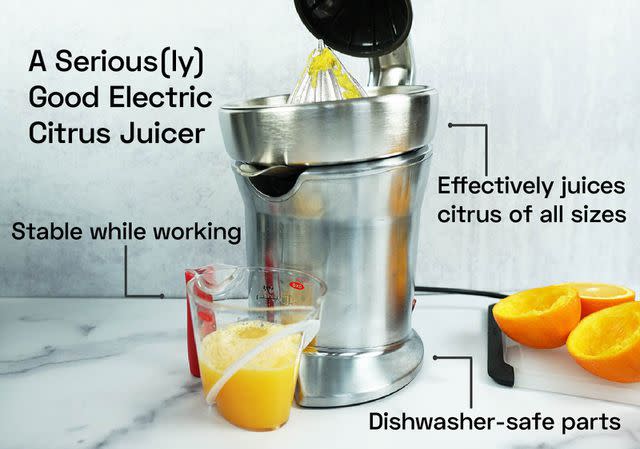
Serious Eats / Riddley Gemperlein-Schirm
Our favorite electric citrus juicers juiced citrus of various sizes well, were easy to use, and had removable, dishwasher-safe parts. While we thought the Breville lever-style citrus juicers were a cinch to operate and, overall, the most effective, they’re also very tall and tough to store. The two pressure-activated juicers we recommend (Smeg and Black+Decker) are more compact options. For those who find electric citrus juicers tough on the hands/wrists, we tested one mostly-automated model that only requires you to place the citrus on a spindle, close the lid, and press a button to juice.
Breville Citrus Press Pro Juicer
The Best Electric Citrus Juicer

What we liked: With an all-metal construction, this solid juicer worked effectively and was very easy to use. It has a comfortable, grippy lever that was easy to hold onto and an extra-pointy spindle that kept citrus in place. Its reamer had long, pointy fins and wings that sat more flush with the strainer plate, which helped to effectively juice citrus and remove any additional juice from the pulp in the plate as the reamer rotated. Unlike some lever-style juicers, the reamer only began spinning once the lever was pressed down onto it. It’s also very quiet, has a long power cord, and its removable parts are dishwasher-safe. We liked the “eject” button on its juicing cone, which made it easy to remove.
What we didn’t like: This expensive juicer is also very large—weighing 11 pounds and measuring 18 inches tall. Its handle also doesn’t seem to lock down for more compact storage.
Price at time of publish: $230.
Key Specs
Weight: 11 pounds
Dimensions: 11 x 9 x 18 inches
Materials: Stainless steel
Noise level: Quiet
Cord length: 36 inches
Care instructions: Removable parts are dishwasher-safe
Warranty: 1-year limited
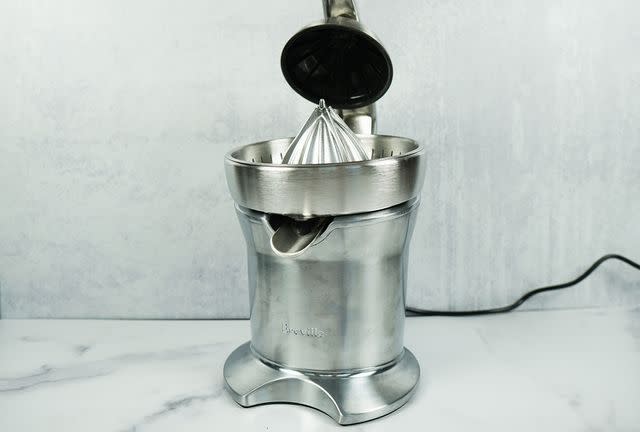
Serious Eats / Riddley Gemperlein-Schirm
Breville The Citrus Press
Also Great

What we liked: This juicer is fairly identical to the Press Pro and performed as such, with some small differences. Namely, it has a plastic reamer and body instead of metal, which makes it lighter weight, but a little less stable. Otherwise: it worked exceptionally well, juicing citrus small and large quickly and thoroughly. It was very quiet and had a long power cord, which we appreciated.
What we didn’t like: The juicing cup had to be pulled off with a little force (this model does not have the “eject” button of the Press Pro). At 18 inches high, it’s still very tall and hard to store.
Price at time of publish: $150.
Key Specs
Weight: 7.1 pounds
Dimensions: 7.5 x 9.5 x 18 inches
Materials: Plastic; stainless steel
Noise level: Quiet
Cord length: 37.25 inches
Care instructions: Removable parts are dishwasher-safe
Warranty: 1-year limited
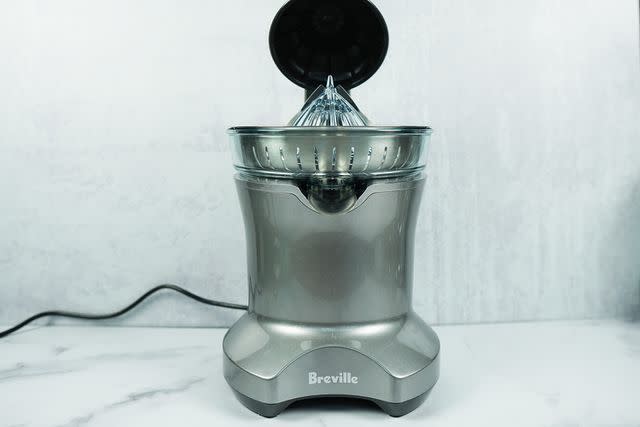
Serious Eats / Riddley Gemperlein-Schirm
Smeg Citrus Juicer
The Best Electric Citrus Juicer If Aesthetics Are of Concern

What we liked: This retro-looking juicer is pretty snazzy and eye-appealing, like all of Smeg’s appliances. However, we also found it worked well—especially with larger oranges and grapefruits, where we could really wrap our hands around the citrus and help the rather blunt reamer juice it. It was one of the quietest pressure-activated electric juicers we tested (a smidge louder than the Brevilles). Most of its removable parts (besides the reamer) are dishwasher-safe, and it’s an overall more compact option.
What we didn’t like: Its lighter weight and slightly narrow base meant it shifted occasionally during tests, but not alarmingly so. And it was still much heavier and more stable than other juicers of this style. Of course, it’s pricier.
Price at time of publish: $200.
Key Specs
Weight: 5.5 pounds
Dimensions: 6.54 x 6.54 x 11.06 inches
Materials: Stainless steel; plastic
Noise level: Fairly quiet
Cord length: 33.5 inches
Care instructions: Reamer must be hand-washed; other removable parts are dishwasher-safe
Warranty: 1-year
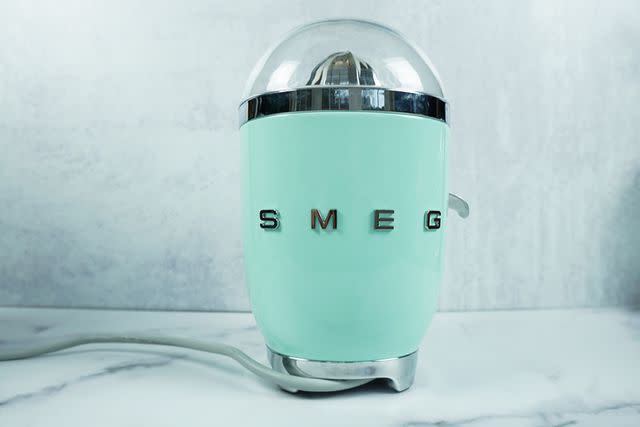
Serious Eats / Riddley Gemperlein-Schirm
Black+Decker CJ625 Citrus Juicer
The Best Budget-Friendly Electric Citrus Juicer

What we liked: A lightweight, compact option with a 32-ounce carafe, this affordable juicer did well throughout testing, but performed best with large citrus. It features swappable smaller and larger reamers, as well as cord storage and a handy pouring spout on its pitcher. Its removable parts are dishwasher-safe.
What we didn’t like: This model is awfully loud, has a short power cord, and is very lightweight, which means it’s not super stable. While the carafe does have measurement markings (for 8, 16, 24, and 32 ounces and 200, 400, 600, 800, and 1000 milliliters), the markings are clear, tiny, and tough to see. They’re also on one side of the carafe only, whereas other models had them on both sides, which we thought was more user-friendly.
Price at time of publish: $24.
Key Specs
Weight: 2 pounds
Dimensions: 7.68 x 7.68 x 9.5 inches
Materials: Plastic
Noise level: Loud
Cord length: 24.5 inches
Care instructions: Removable parts are dishwasher-safe
Warranty: 2 years
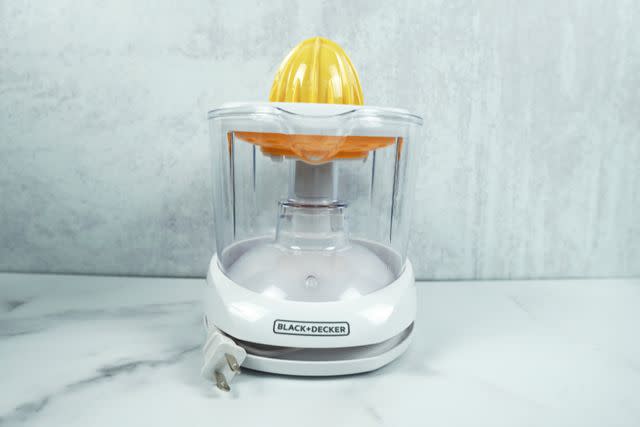
Serious Eats / Riddley Gemperlein-Schirm
Vinci Hands-Free Electric Citrus Juicer
The Best Mostly Automated Electric Citrus Juicer

What we liked: This was the only mostly automated electric citrus juicer we tested, and we think it’s a good option for those who find other models difficult to use or too reliant on hand/wrist strength. Because the juicer juices the citrus for you after you’ve placed it on the spindle, shut the lid, and pressed a button, it’s very easy to use. It also has a fairly long power cord.
What we didn’t like: It didn’t juice the best, but still did a pretty good job. It was also moderately loud and its attached, hinged lid was more cumbersome to clean.
Price at time of publish: $100.
Key Specs
Weight: 4.31 pounds
Dimensions: 7 x 8.5 x 12.5 inches
Materials: Plastic; stainless steel
Noise level: Moderately loud
Cord length: 35.5 inches
Care instructions: Removable parts are top-rack dishwasher-safe
Warranty: 1-year limited
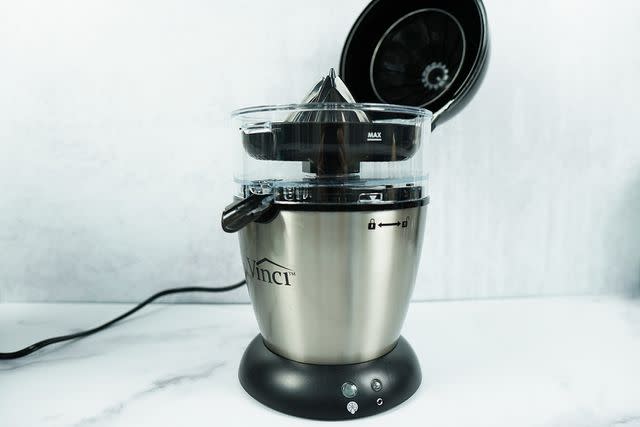
Serious Eats / Riddley Gemperlein-Schirm
The Competition
Cuisinart CCJ-500P1 Pulp Control Citrus Juicer: This model did a sub-par job juicing and felt very cheaply constructed (when you pressed the chute up/down, the whole top shifted).
Dash Citrus Juicer Extractor: This juicer almost beat out the Black+Decker for our budget-friendly pick, but it did worse with larger citrus and its plastic lid did not fit well. However, if you’re looking for a budget-friendly recommendation and the Black+Decker is out of stock, this is the one to get.
Gourmia Electric Citrus Juicer: This lever-style juicer juiced limes very poorly. It also had a pressure-activated reamer that moved when we placed citrus on the spindle, which felt more jarring than the Brevilles’ design.
Proctor Silex Juicit Electric Citrus Juicer: This juicer did fine and was another one that was in contention for our budget-friendly recommendation. However, it was even louder than the Black+Decker. That said, it’s still a fine inexpensive electric juicer.
Eurolux Electric Citrus Juicer Squeezer: With suction cup feet that were meant to keep it in place, this lightweight juicer was annoying to move and performed only so-so. Its lever shifted with the rotation of the reamer and its pressure-activated reamer began spinning as soon we placed citrus on it. Like with the Gourmia, we found this jarring.
LUUKMONDE Electric Citrus Juicer: Exceedingly cheap-feeling but not terribly performing, this juicer was very lightweight and shifted too much during testing. It lacked features other inexpensive juicers had, like wrap-around cord storage or a lid.
FAQs
How do you use an electric citrus juicer?
How you use an electric citrus juicer depends on the type of juicer you have. For lever-style ones, place a citrus half on the reamer spindle, then lower the juicer’s arm and juicing cup down onto the citrus. The citrus will begin juicing and juice will come out of the juicer’s spout. For a pressure-activated juicer, place a citrus half on the reamer, hold it steady, and press it downwards as the reamer rotates to juice it.
How do you clean an electric citrus juicer?
Many electric citrus juicers have dishwasher-safe removable parts (we suggest consulting the manufacturer’s care instructions). Otherwise, hand-wash them with warm, soapy water. The electric base should never be submerged in water and should be wiped with a clean cloth.
Who makes the best electric citrus juicer?
Two of our favorite electric citrus juicers are from Breville. However, we also have top picks from Smeg, Black+Decker, and Vinci.
Read More:Our Favorite Countertop Appliances

